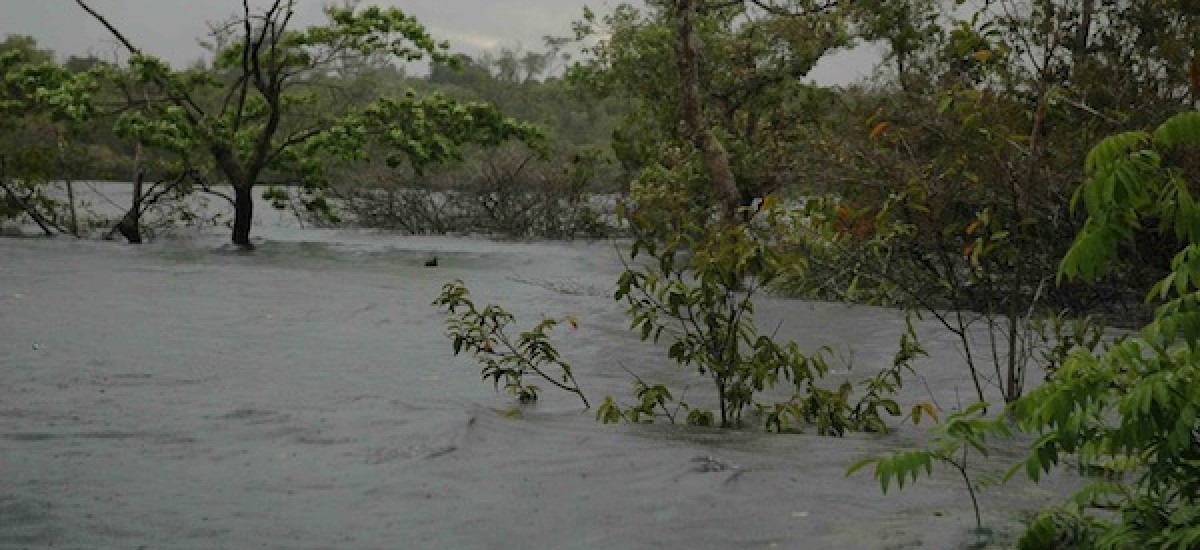Devo vassatu Kalena (may the rains fall in due season)
Sassa sampattu hetu ca (may there be a rich harvest)
Phito bhavatu loko ca (may the world prosper)
Raja bhavatu dhammiko (may the ruler be righteous)
Four conditions governing the well being of humanity each inexorably tied to the other. It has been pointed out by many commentators this also reflects the traditional view of the system of governance. Without a righteous ruler, the rains will not come in season, the harvest will be poor and the world will not prosper.
Many millions recite this verse every day, well aware of Dharma (as the perennially fixed set of natural laws governing causation). These laws present the structure of rules which if understood correctly leads to natural or skillful action (dharma) which provides fortunate consequences (kusala kamma) or if not understood and contravened leads to unskillful action (adharma) with unfortunate consequences (akusala kamma). Wholesome, fair-minded actions always bring forth positive future results whereas unwholesome and unjust actions lead to suffering, misery and future retribution.
It is with this perspective that we should look at our current situation. The question posed by many is ‘whether the unseasonal rains, droughts and resulting human suffering and misery is caused by rulers bring non-righteous.’
Droughts, floods and famines have been with us for thousands of years, destroying communities and nations. Governments through their access to information and technology about avoiding these events, should harness and utilize this knowledge to provide solace to the millions suffering from harsh climatic upheavals. But unfortunately they have not. Rather, they have adhered to technologies that accelerate climate-changing conditions through the consumption of fossil fuel as the driver of ‘development’. This irresponsible activity has only resulted in accelerating and intensifying such natural disasters and increasing human misery.
The unseasonal deluges of rain in Sri Lanka this year rendered over 200,000 people homeless, The ‘superstorms’ like Sandy that devastated New York last year or the current unprecedented heat wave in Australia are just the start of times when the akusala kamma or the consequence of the irresponsible activities of non-righteous leaders begin to manifest.
Non-righteous leaders urge us to chase ‘economic development’ without questioning the primary national or international cost of this activity. Further, the consequence or impact of such ‘economic development’ on the environment or on human life is never considered, only monetary growth and maximization of profit is. Such actions contravene rules of dharma, which,if not understood and contravened leads to unskillful action (adharma) with unfortunate consequences (akusala kamma).
The current climate crisis is a consequence of consuming non-renewable resources unskillfully. Ignoring, scientific and common sense considerations, our ‘leaders’ allowed the poisoning of our atmosphere and waters in the interest of “economic development”. To make matters worse, the judiciary who were tasked with protecting public well-being has ‘slumbered’ while the environment was being destroyed by ‘developers’. As clearly pointed out by Justice C.S.Weeramantry in his book ‘The Slumbering Sentinels’ (http://www.wicper.org/resources/view/slumbering_sentinels). It is this process that has pumped our fragile atmosphere full of the gasses that are now destabilizing the climate and bringing about vast human misery by accelerating and intensifying natural disasters.
The activity of economic growth, measured only by such indices as GDP, moves a society to be dependent on consumption. The more one consumes the better the GDP. To consume more, one must crave more, but to a Buddhist society the karmic consequences of such craving should be obvious ( http://groundviews.org/2011/10/17/development-or-maldevelopment/). Development, beyond the provision of a measure of human well-being, becomes a particular word view often driven by a pecuniary philosophy. Today the development paradigm is still driven by fear, greed and desire, the same values that created the problems facing us. (http://groundviews.org/2011/11/08/desire-violence-and-leadership/)
Greed and desire powers ‘ growth through cronyism’ which further enriches people with power or capital and creates a class of ‘super rich’, which rapidly widens the inequality gap between rich and poor. This widening of the gap should be a reason for national concern, because inequality causes shorter, unhealthier and unhappier lives; it increases the rate of teenage pregnancy, violence, obesity, imprisonment and addiction; it destroys relationships between individuals born in the same society but into different classes; It will not bring prosperity to society. ( http://groundviews.org/2012/06/18/the-price-of-inequality/).
Economic Development based on the consumption of fossil energy, has been long cherished myth among some powerful bureaucrats in Sri Lanka. Consider that official announcement made in 1979 states:
“No oil means no development, and less oil, less development. It is oil that keeps the wheels of development moving”
It is this myth of ‘development’ that has brought us to the energy-addicted state of today and it is this same myth that drives the ‘economic development’ vision of today.
Compare that vision with that of the Shuar peoples of Amazonian Ecuador, under whose territories lie huge reserves of oil. Unlike those eager to extract oil from their territories, they have rejected exploration, they see it as an evil force. They have a saying:
“Oil’ represents the sprits of a long dead world, that we use to satisfy our greed for power and sacrifice and our children in return.” (thruths from..).
Here lies a truth that cannot be escaped when looking at climate change. The more fossil fuels we burn the more we compromise the future of the children. No amount of rhetoric can deny the fact that, the more climate changing gasses we emit in the name of development the more we contribute to the climate crisis.
Thus:
As long as the rulers do not accept their responsibilities to protect the well being of the environment that sustains humanity:
The rains will not come in season
The harvests will not be bountiful
The world will not prosper
No amount of burning of petroleum, making roads or cement constructions will make it rain in season. No amount of fossil fertilizers will make our fields bountiful. No amount of loans will make us prosper.
Devo vassatu Kalena
Raja bhavatu dhammiko


